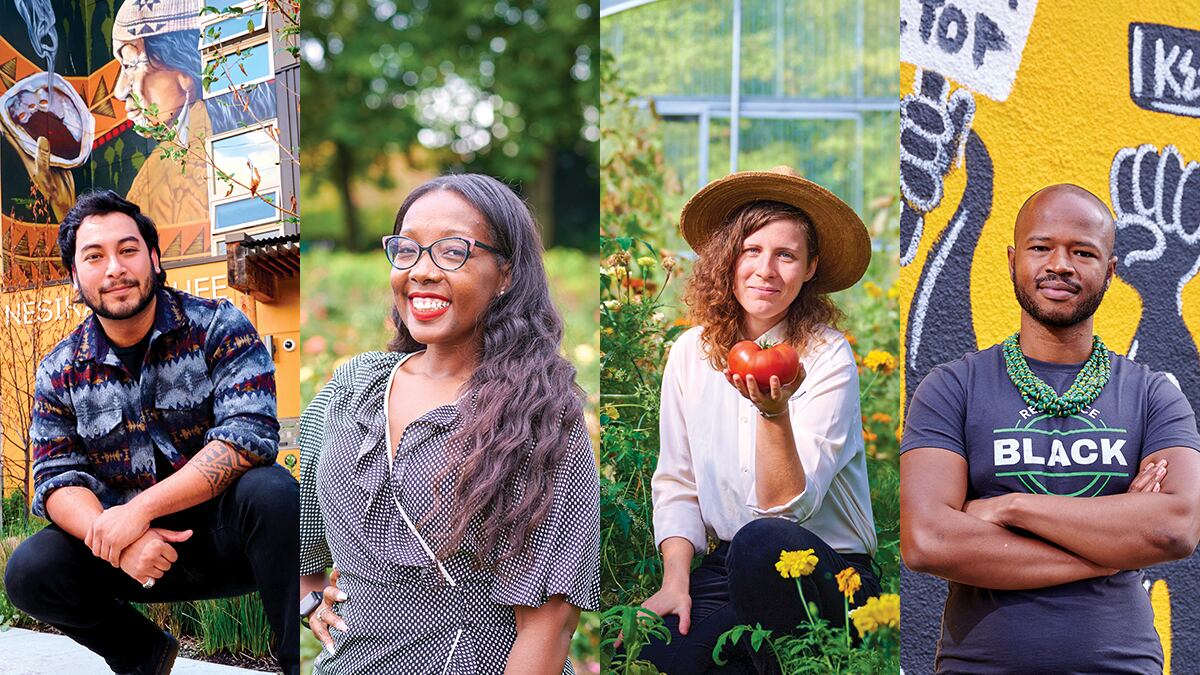If you’ve ever wondered who’s really making a difference in our community, look no further. Willamette Week awards the Skidmore Prize to four young Portlanders who work to make Portland a better place and to preserve the community-oriented nature of the city we all know and love.
The Skidmore Prize is a nod to the inscription found at the base of Skidmore Fountain near the Burnside Bridge: “Good citizens are the riches of a city.” Each of this year’s winners embody this altruistic spirit and make our community better.
Of the 128 nominees this year, just nine advanced to the finals. All of them are under the age of 36 and work full time for a local nonprofit. This year’s finalists included: Xilax Callier (Outside In), Katie Cox (Equi Institute), Danielle Elowe (Rahab’s Sisters), Whitney Shevrey (Outside In), and Sula Willson (North Pole Studio). The 2021 Skidmore Prize winners are featured below.
Kendra Johnson
35 // Impact NW
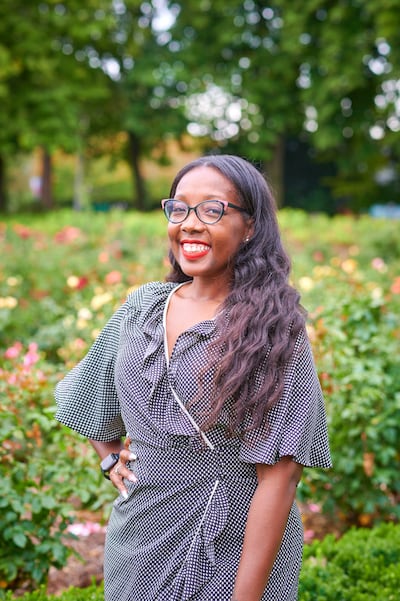
It’s said that everyone is one unforeseen disaster away from ending up on the street. Kendra Johnson has spent the past 13 years laying out safety nets across Portland. As the deputy director of Impact NW, Johnson helps connect 20,000 households annually with the services that prevent the city’s most vulnerable populations from falling into homelessness, whether it’s food assistance, addiction recovery, parenting support or job training.
Give!Guide: How does your personal experience inform your work with Impact NW?
Kendra Johnson: I was born and raised in Northeast Portland. I also come from generational poverty. My mom worked really hard to begin to break that cycle, and so did my grandmother. I come from a line of people trying to make it better for the next generation. So I knew I wanted to help continue trying to make the community better. I didn’t know that it would be nonprofit work. But when I got into school and learned more about what nonprofit work actually does, I felt like that was the place for me.
Homelessness is a major problem in Portland. What is the root cause?
I don’t think there’s one root cause. There are many issues that plague the community currently and historically and collectively they have resulted in an increased homelessness. Yes, how much it costs to live here is part of it. But I also think policies and systems that are not built to help people that might need mental support or might need some addiction recovery support, as well as housing, play a part. Homelessness is a major problem in Portland, and so is housing insecurity. Many families are on the verge of becoming homeless, and that’s where Impact NW comes in - we help people from ending up on the street. Root causes of homelessness are due to low wages, unaffordable, and scarce housing options. We also have to address racism, mental health, and addiction if we want to address homelessness.
What does an average work day look like for you?
There’s no “average day.” One day I might come in and I’m working on budgets. The next day I might be at a school helping to fill in for after-school programming. The next day we might be trying to figure out how to get a contractor to put A/C in a senior’s home before the next heat wave. We believe our clients are the experts in their journey, so we try to meet them wherever they’re at.
What are some of the roadblocks you’ve encountered that can make the job difficult?
Just not having enough resources for the amount of need. The hardest thing is telling someone “no” or “not right now.” It’s also very motivating because that means that, on my end, we need to continue to do more advocacy and find additional partnerships. And if we can’t do what they came here for, what else do they need? It might be energy assistance instead of housing support right now. It might be a food box or some clothing. What else can we help them with while we’re looking for other solutions? We don’t want them to walk away without a plan.
Is there an interaction you’ve had through Impact NW that you’re particularly proud of?
I started working here like 13 years ago, pretty fresh out of college, and I was in the Independent Living Program. There was a young person who had refused to work with me. I continued to call them every month for a really long time to say, “I’m here for you if you want our services.” Finally, they’re like, “All right, let’s meet.” That person went to college, graduated from high school, is working at a local hospital, and has their own place. And when they’re able, they’ve come back and volunteered with Impact NW and talk about their journey. That was like a 13-yearlong journey from meeting that person to them coming back and volunteering and seeing them flourish.
Lou Lé
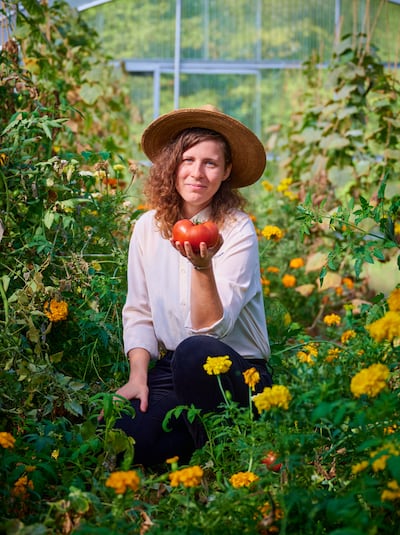
32 // The Kindness Farm
In October 2020, Lou Lé had the idea to start a small-scale farm to distribute free, fresh produce to Portland’s increasing number of food justice organizations. By January, she had secured 1.25 acres of land in Pleasant Valley and all the material needed to start growing radishes, kale, tomatoes and other fruits and vegetables. Since then, Kindness Farm has provided over 5,000 free meals and produce boxes for houseless Portlanders and low-income neighbors experiencing food insecurity.
Give!Guide: Tell me how your personal experience informed the creation of Kindness Farm. Have you experienced food insecurity before?
Lou Lé: I haven’t experienced what I would consider food insecurity myself, but generationally, there’s definitely food insecurity in my family and in the culture that I come from. Even two generations back, to my great-grandmother, they’re farmers pretty much all the way from there and back, and they all just grew all their own food and lived in a village in the former USSR. So they really just depended on the land and sharing with neighbors. Then with my grandma and my mom, they kind of got away from that in search of a better life. So for me, it’s kind of full circle, bringing it back to my family roots of being connected with the land and being able to provide for people from a more stable place.
How were you able to get the farm off the ground so fast?
I’ve been an entrepreneur for the last 12 years. I dropped out of college when I was 20 and started my first business at that time with my ex-partner. We started from nothing. We were completely broke, and we had to really learn how to make something successful and make something grow in the real world. As soon as I got the idea for [the farm], and it felt right to me as the thing I was going to do next with my life, I just did what I know how to do. If there’s something I’m really good at, it’s if I need something, I’m going to get it done, and I’m going to get it done really fast. So that’s what I did.
What’s been the reaction from your partner organizations to the service you’re providing?
A lot of these organizations have told me it’s a lot easier for them to get dry goods or things that are more processed because they’re really cheap, but they don’t have a consistent source of really fresh and healthy produce that was just grown and harvested today or yesterday. So having that access has been very important to them.
How are you hoping to expand the Kindness Model in the future?
There are three facets. The first one is to finish cultivating the rest of our farmland, which still has some room to expand. In addition to that, one of my goals was to have a program where people could donate a portion of what they grow in their own homes or plots through the farm, along with what we donate to different organizations. The last one is creating more Kindness Farms in more communities. I really believe in small-scale farming. It’s a very healthy way to interact with the land and with life. People have reached out to me from different places, even in Vancouver and up north, where they want to replicate that idea and want me to basically advise them on how to do that. So I think there are a lot of people who want to see it in their communities already.
Gerard Rodriguez
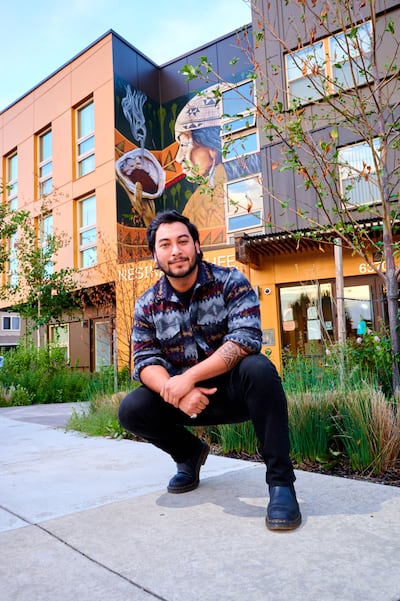
25 // Willamette Falls Trust
As the director of tribal affairs for Willamette Falls Trust, Gerard Rodriguez is engaging with Oregon’s Indigenous population on how best to integrate Native perspectives and traditions into the development of the Willamette Falls Riverwalk in Oregon—the first of several projects aimed at honoring tribal history and traditions across the state.
Give!Guide: You’re the youngest of this year’s Skidmore Prize recipients. How did you end up in the nonprofit sphere?
Gerard Rodriguez: I feel, for myself and for a lot of other people that grow up in communities of color, community work is not really much of a choice, but really a need; one of survival and responsibility to yourself, to your community, and to everything in life that helps give you the opportunity to be here. Starting out really young, this is the essence of what I was asked to do all the way from advocating to the U.S. Forest Service as a high school student for funding for Indigenous-specific programs and natural resource management. That just continued to lead down to more asks and more opportunities to make a difference in that way.
What was your relationship to Willamette Falls growing up?
It’s a place that’s known throughout Indian country, all across what is now called the state of Oregon and beyond. Tribes from across Oregon, Washington and tribes from Idaho all have connections to this place, and people would come from well over 200, 300 miles [away] as part of a seasonal round. I think my connection to the falls, and to the importance of place, is one that I was raised with. Everywhere you go, you’re a part of the land and the water. Those things provide for you. So it’s our responsibility, no matter where we are, to help protect them, to help honor them, and to help continue their lives so that ours can [continue] as well.
How has the organization gone about integrating Indigenous values and traditions into the riverwalk project?
Our role really is to listen and to help build opportunities for more of that listening to take place. It’s going to communities, it’s listening to those that pass on culture, that pass on stories and language, and can also share what they need to see in order to help not just represent them in interpretation and historical telling, but bring that knowledge into the present and into the future. It’s a matter of access to the river, access to demonstrating, and experiencing traditional fishing and passing on cultural teachings.
Is there an interaction you’ve had that you feel particularly represents what you’re hoping to accomplish with the Willamette Falls Trust?
In working to gain the board of delegates that we have from each of the tribes, which was something that began in the summer of 2020 when I came on, going to Warm Springs and hearing chief Delvis Heath speak about the falls with such reverence, especially as his community was undergoing so much loss, and really looking to this as a significant part of the future, a significant part of all of our shared responsibility, and the hope and the continuance that is symbolized through the falls—hearing that from him, and then subsequently having him be the appointed delegate to our board to represent that community, is so deeply touching and really demonstrates the significance of what this place is and what it deserves to each of the Tribes.
cameron whitten
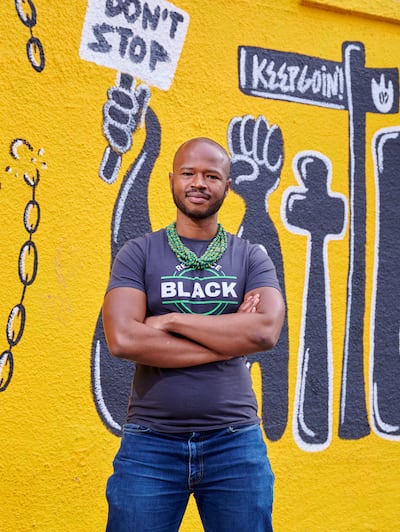
30 // Brown Hope
If the Portland nonprofit world has a true superstar, it’s cameron whitten. They’ve spent the last decade on the front lines in the fight for social justice—holding hunger strikes on the steps of City Hall, campaigning for LGBTQ rights and even running for elected office, including the mayorship. But they’ve made their greatest impact as the founder of Brown Hope, an organization dedicated to supporting Oregon’s communities of color through a variety of programs and initiatives, most notably the Black Resilience Fund, which last year managed to distribute $2 million in financial assistance for Black Portlanders in need.
Give!Guide: You’ve been involved in the racial justice movement since long before the recent uprising that started in 2020. How has the last year changed things?
cameron whitten: Last year was this huge explosion, kind of like the Big Bang that created the universe—it filled us with so much excitement and imagination and opportunity, but just like we saw with the universe, after you had this big explosion, you also see contraction. And right now, I feel like that is the period where we’re in, where some of that momentum has rolled back. We’ve had a lot of conversations as a team knowing that the Black Resilience Fund, for example, was launched with the help of over 300 volunteers, some of whom were basically volunteering on a full-time basis. That was a lot of white folks, and most of those white volunteers are no longer here. That has a real impact on Black Portlanders. But the reality is, we can’t give up. We can’t be bitter, we can’t be resentful. We have not taken this momentum for granted. Prior to George Floyd’s murder, Brown Hope, as an organization, we were scrappy. We were 100% volunteer run. Now we have 13 full-time staff and other contractors and temporary staff. And we’ve been able to position this organization to have a lasting impact on racial justice in Portland, far beyond this moment. So I choose to remain hopeful.
It’s often said that Portland is the whitest city in America. Do you feel an organization like Brown Hope is more crucial here because of those demographics?
Brown Hope was created specifically because of Portland’s and Oregon’s history, and also because of my own life experience here. I first came into Oregon at the age of 18, and I stayed at a friend’s dad’s house in Albany. I was asked to leave the dad’s house because I was Black. That act was not isolated. That act was enshrined within the painted history of Oregon. The other issue is, in other cities, even if you might face the challenges of racism, at least you are able to turn toward peers. You have people in your neighborhood, you have community organizations and elected officials who you can see and see you, who understand what you’ve been through because they’ve been through it, too. In Oregon, we have less of that luxury. Not only are we so little represented in our population, displacement has spread us out to where we don’t have geographic cohesion. Brown Hope was created specifically because of this dire dynamic in Portland.
Is there an interaction you’ve had that you feel is particularly emblematic of what Brown Hope is hoping to accomplish?
There’s so much. And what I think is magical is that those stories are a daily thing. I get to be part of a Power Hour as the host on a weekly basis. Hearing the stories of folks, whether that’s folks who are in recovery, folks who are trying to get employment after a long period, folks who are trying to adopt or dealing with the criminal justice system—just hearing so many stories of folks who are getting support, who are building confidence, who finally feel like they’re not alone. I think we are so fortunate because we have emerged into Portland with such a unique model that for many people it is a breath of fresh air. It gives me so much joy to see that people will respond so well to our wild dreams.
